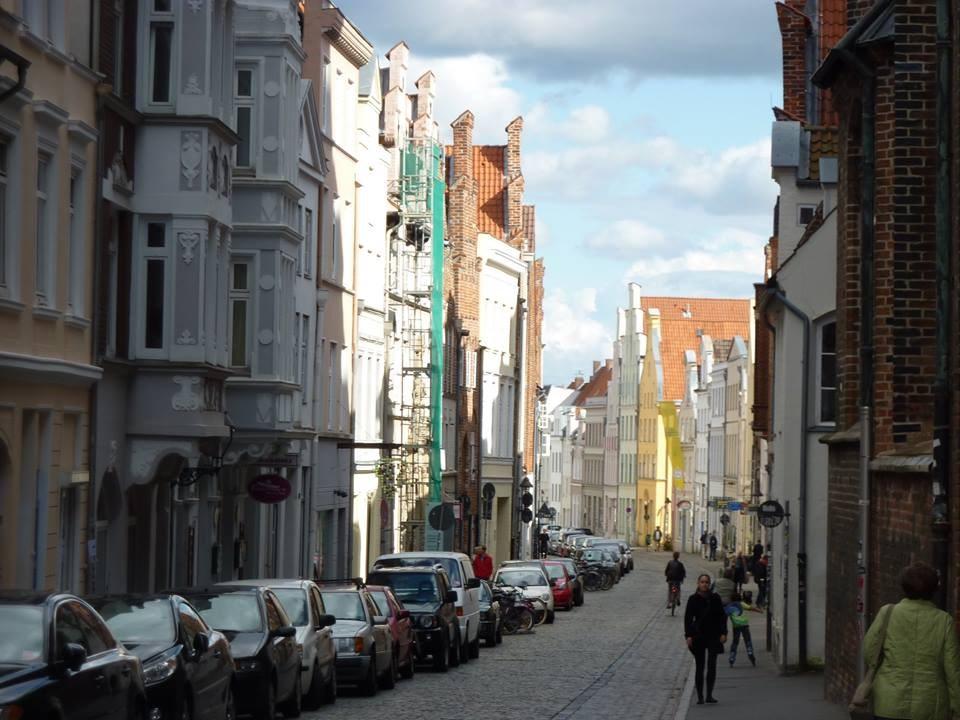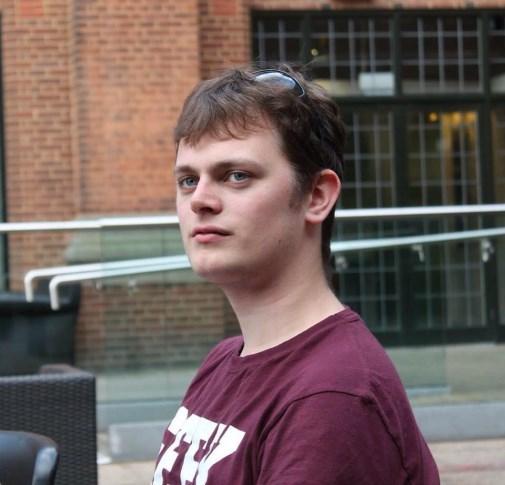SPECIAL EDITION: MEET THE TEAM


FRANCE
FRANCE’S ANSWER TO THE GREAT BRITISH BAKE OFF
POLAND







































THREE POLISH VIDEO GAMES YOU SHOULD DEFINITELY PLAY
COOKING IN CATALONIA
INDIA A COUNTRY OF CURIOSITIES

WINNER OF OUTSTANDING OUTREACH 2015 SPAIN
TRAVELLING IN THE SLOW LANE
Linguist Secretary Jenny Nicholls reflects on ten day trip travelling by train in Germany and Denmark PAGE 9
Issue 13 OUR NEW TEAM
EDITOR’S NOTE




































































































Ciao! Olá! Nĭ hăo! Welcome to the first edition of the year of The UoB Linguist Magazine; our special Meet The Team issue!
We are an internationally themed magazine founded and produced by students for students. We pride ourselves on providing the only opportunity for students to write and read articles in foreign languages!
Our magazine is packed with fascinating travel anecdotes and views on international news, cookery and lifestyle. Absolutely anyone can write for us, even if you don’t study a foreign language. You only have to be interested in foreign culture!

We are also a society within the Guild, meaning that you can come to our socials all year and join us to edit, design and write for our publication! We print twice termly and also have a website that is constantly updated with new and exciting content.
We’re a fantastic mix of people united in our passion for foreign culture and our hopes of expanding our society. Please get involved – it is so rewarding to see your name in
by Dominique Phipp
print and looks awesome on your CV!
This edition, unlike any before, has been produced for you entirely by the new editorial team and our committee! Written entirely in English, we have been hard at work to present you an issue filled with stories of amazing travel adventures and photography from all over the world. Check out excellent articles like Isabella’s confidence building experiences as a language assistant in France and Saul’s surprising jaunt through Europe! Also don’t miss Kia’s beautiful header illustrations; I think they add a lovely personal touch to our publication. I am really proud of all the work we have put into this issue (my first issue as the new Chair!).
We all hope you enjoy reading! Don’t forget to look out for our next multi-lingual issue at sites across campus and online in November! Maybe you can even send in an article or two…
(Front Cover Image and above Image: Monumento a La Carreta, bronze sculpture by wellknown Uruguayan sculptor José Belloni. Photo Credit: Kia Marie Hunt)
FEATURED
ARTICLE
October
2015
PAGE 3: MEET THE CHAIR
PAGE 4: MEET THE SECRETARY
PAGE 5: MEET THE CREATIVE DESIGNER
PAGE 6: MEET THE PUBLICITY OFFICER
PAGE 7: MEET THE PROOF READER
PAGE 8: MEET THE CURRENT AFFAIRS EDITOR
PAGE 9: MEET THE SPANISH EDITOR
PAGE 10: MEET THE FRENCH EDITOR
PAGE 11: MEET THE POLISH EDITOR

PAGE 12: MEET THE LIFE AND STYLE EDITOR
PAGE 13: MEET THE TRAVL AND CHINESE EDITOR
























































PAGE 14: MEET THE ITALIAN AND RUSSIAN EDITOR
PAGE 1 : MEET THE REST OF THE TEAM
If you would like to know more about our magazine, our writers or have comments to make about our articles then feel free to check out our Facebook and Twitter pages or email us. If you wish to read more articles check out our website. We’re always looking for new writers and contributors, so don’t hesitate to get in touch!



IN THIS ISSUE 3 7 THEUOBLINGUIST.CO.UK UoBLinguist_Mag The UoB Linguist Magazine UOBLINGUISTMAGAZINE
linguist@guild.bham.co.uk
CONTACT US
COUNTRY OF CURIOSITIES
dictions. The noises, the smells, the varied cuisine and the multitudes of different dress are and an exciting blow to the senses and a confounding mystery to the newly arrived English person.

Role: Chair
Currently Studying: History, Ancient History, and Archaeology
Languages: Spanish and French


Favourite Foreign Food: Sushi
Favourite Foreign Film: LesIntouchables

Favourite Destination: India
My expectations had prepared me for the ultimate culture shock and India did not disappoint! Walking off the plane I was hit with a wall of summer heat that forced me to a standstill. The humidity too took me some time to adjust to, but after a few weeks wallowing in the warmth I did actually begin to enjoy it. The barrage of car horns honking and rickshaw drivers hollering for travellers did also take some getting used to, but the continuous noise felt all part of the fun from the start!
Having grown up in central London, the cacophony of sounds and crowds of people weren’t such a change from my norm and I comfortably settled into life in India, even feeling quite at home. The smells, on the other hand, are a challenge for even the most tolerant of people! The stench of the streets, interchanging rapidly between the stink of sewage and the sweet aroma of fruits and warming dishes cooking is enough to dampen anybody’s appetite! The huge varieties of people, and particularly their mixed styles of dress, are also a puzzling mass of bright colours to the foreign eye. Ladies walk by in beautifully decorative patterns of cloth, while men dress in anything from western suits to sherwanis with churidars. Their accessories too are assorted and each entwined with meaning. For instance, Rajastani turbans of different styles and colours can indicate the caste, class and region of the wearer. The exchange of their turbans also means undying friendship.
With so many sides and surprises to this country of curiosities, one can never have the same experience of India as another. I cant wait to travel back to India to explore more of its contrasting regions.
THEUOBLINGUIST.CO.UK 3
Role: Secretary


Currently Studying: Modern Foreign Languages (Spanish and German)
Languages: German, Spanish, French and a little Danish Dream Travel Destination: Canada

TRAVELLING IN THE SLOW LANE

This summer I went on a ten day trip around Germany and Denmark by train – my first solo travelling experience, and one that taught me a valuable lesson: taking it slow when visiting new places is far more interesting (and relaxing!) than trying to cram something into every minute of every day.
While I had enjoyed the leisurely pace of travelling by train to my first destination, Cologne, I still insisted on planning my days there with almost military precision in order to see as much of the city as possible. But I soon realised that by rushing from one tourist attraction to another on the U-Bahn, I had actually experienced far less of the city than if I had approached it with a more relaxed attitude.
I tried things a little differently from then on. In Hamburg and Copenhagen, I walked everywhere instead of using the metro, which meant I saw interesting things that I would have otherwise missed. I took my time in coffee shops, just watching the world go by out of the window.
By slowing down the pace, I gained far more of an impression about the cities and their inhabitants than I did in Cologne.
That isn’t to say I didn't do touristy things: in Copenhagen I went on a great boat tour of the canals. However, I think a whistle-stop tour like that should only be a starting point for further exploration. Visiting a city is not just a checklist of things to see, as was my initial approach. When you only have a few days in a big city, you cannot possibly do everything there is to do, so it’s more about getting a taste, however brief, of the atmosphere of a place and its people.
 (Above: One of the charming cobbled streets of Lübeck, Left: A picturesque part of the Speicherstadt in Hamburg )
(Above: One of the charming cobbled streets of Lübeck, Left: A picturesque part of the Speicherstadt in Hamburg )
UTSTANDING OUTREACH 2015’! 4
GETTING TO KNOW URUGUAY

As a lover of all things Hispanic, I decided to spend my year abroad in South America. For the first half of this big adventure, I am living and studying in Montevideo, the capital of Uruguay. Sandwiched between the two Latin American giants that are Argentina and Brazil, it is easy for this little country to be overlooked. In fact, part of the appeal for me was that people know so little about it; I love to feel like I am exploring places that are unknown and mysterious. But now, after having spent two months here already, (the time has gone so unbelievably fast!) I feel as though I’ve learnt enough about the culture to be able to let you in on the top things you need to know about this unfamiliar place.
Montevideo only disguises itself as Western: Many articles I read before arriving referred to Montevideo as the most ‘European’ city in South America. When I got here, I believed that this was true. In fact, it was almost disappointingly similar, and I didn’t feel like I was on another continent at all. However, as time passes here I’ve begun to realise that the layer of westernisation that drapes over this city is only a thin veil, and that if you look closer, so many Latin American quirks will show through. Some of these are great things, such as the lively and distinctive Cumbia music you can hear everywhere you go, the bustling street markets that you can discover in a new location every day, or the musicians and magicians busking in the middle of the road or on the bus (which makes journeys a lot more interesting I must say.) However, from time to time, some things will also reveal themselves that remind me just how ‘third world’ Uruguay still is, such as people from the slums travelling through the city with their old horse and carts, dumpster diving for any piece of rubbish that they could salvage or sell. But even these seemingly unpleasant realisations don’t make me feel sad about being here, instead they are very humbling, and they make me appreciate just how fascinating this window into Uruguay’s secrets is.
The pace of life is extremely slow: Although not very articulate, one great way to describe the attitude of Uruguayans would be ‘super-chill.’ They seriously know how to take things easy here. I’ve realised that in the UK we are so obsessed with the future, always making precise plans, filling up our schedules, rushing around, and never really just going with the flow. Here, the lifestyle is so much more relaxed, everything is about taking your time, enjoying the moment, and finishing things ‘mañana.’ Although this can be frustrating at times, especially when waiting for food, in general it has many advantages. I’ve stopped planning the future so much and started enjoying my life day by day, I’m more relaxed, I walk slower and I find it easier to appreciate everything around me. And of course, the best benefit; you’re 2 hours late to a 2 and a half hour lecture? Don’t worry, no one cares!
Mate, mate, mate: Last but not least, I must mention mate (pronounced maté.) Mate is a traditional Uruguayan beverage made with dried leaves of yerba mate and hot water, it tastes like slightly bitter green tea, and I’m not exaggerating when I say that people here are obsessed with it. Literally everywhere you go there will be someone with their thermos flask, mate, and bombilla, (a special type of metal straw) as it seems that almost every inhabitant of Uruguay is addicted to this caffeine rich drink. It is an unwritten rule that you simply cannot leave the country without trying it!
Role: Creative Designer Currently Studying: Hispanic Studies
Languages: Spanish, Portuguese, Galician and a little Polish
Favourite Foreign Food: Caribbean Food Dream Travel Destination: Japan

5 THEUOBLINGUIST.CO.UK
ON THE ROAD: GLASTONBURY TO BENÍCASSIM
For me, summer is a period in which one can escape reality. In my case, as with many others, this can only signify one thing; festival season. Increasing numbers of people are moving beyond the typically well-trodden tracks of Leeds, Reading or T in the Park. Benícassim, in the eponymous town in south-eastern Spain for me was the simultaneously the most fun I’ve had and the most intense experience I have had on foreign soil.
Indeed, having experienced both the intensity of Glastonbury and Benícassim, it’s beyond doubt that foreign festivals are an event to be ticked off the proverbial bucket list. Glastonbury 2015, like the year previously, was a seismic event. It seems that for one weekend in June, the gaze of almost the whole world is solely set on Worthy Farm in Somerset.
How to describe Glastonbury?
Undoubtedly, there are too many superlatives one could inject into this article, so instead I will try and give you a sense of scale. Glastonbury is big. So big in fact, you feel like a hobbit on a trek to Mordor every time you wish to hear the acoustic rumblings at the Avalon Stage, located at the far end of the railway track. As the name rightly suggests, Shangri La was the ultimate destination to visit on the Thursday. With remixes of Superstition and Classic Funk the order of the day, this labyrinthine dance village is truly the place to go on the Thursday night.
However, if you’re like I and more inclined towards a relaxed hippy circa 1968 vibe, then the Healing Fields with their various massage tents and Yoga classes is your ticket. Falling asleep there on the Saturday not only proved to be an eye opening experience, but also boasts one of the only quiet spots – besides the Stone Circle – in the whole festival.
Certainly, from my experience Glastonbury is the quintessential festival, unlike any other in the world. Coachella being the only other true contender in terms of line-up, but yet, to be able to draw names such as Kanye West, The Who, Lionel Ritchie and Burt Bacharach, all within hours of each other, is what made this year unlike any other year.
Initially at Benícassim I was assaulted by the cauterizing early morning heat which halts any chance of a decent sleep and with most nights of merriment terminating at around six o’ clock in the morning, one begins to crave even the smallest power nap.

In consideration, both festivals are markedly different in price and reality. Glastonbury is the undisputed leading global festival but Benícassim proudly challenges any preconceived notions surrounding infrastructure or locale. Florence + the Machine performed another barnstorming set on the Thursday night alongside fellow headliners Portishead and The Prodigy, all too glorious effect. Benícassim draws big names; Frank Turner and the Sleeping Souls and the effervescent Mark Ronson being standout performances, but it tempers this by being as equally diverse and far ranging as Glastonbury.
Role: Publicity Officer
Currently Studying: Hispanic Studies and History
Languages: Spanish and a little French
Favourite Foreign Film: Pan’sLabyrinth



Favourite Foreign Band: M83 (French)
Ultimately, Benícassim lacks the same sense of grandeur and gravitas, but rivals the Somerset festival in pure adrenaline infused intensity. Not for the fainthearted, Benícassim sears itself like the Spanish sun into your consciousness and leaves you gasping for more. Glastonbury will always have a special place both in the festival world’s heart and my own, but Benícassim is a strong challenger. I’ll be back.
GUILD OF STUDENTS ‘OUTSTANDING OUTREACH 2015’! 6
INTERNATIONAL LINCOLNSHIRE


Unlike many of my fellow Linguist team members, I didn’t have an exotic summer in a sunny summer climate. Instead I worked for PGL, an outdoor activity company, in a centre based in Lincolnshire. Despite the remote rural setting of the centre, guests from all over the world flood to take part in the EFL (English as a Foreign Language) programme run here. They learn English in the morning in a classroom environment, and then spend their afternoon taking part in a range of activities, from kayaking to abseiling. These guests are all children or young people, but the similarities stop there. Their nationalities range from Egyptian to Spanish, with some guests as young as 7 travelling alone, while others come in groups. I talked to Sarah Greatorex, part time EFL teacher about her experiences working with international guests. Why do you think the EFL guests come to PGL? I think the children come because of the activities, such as excursions (to Cambridge and York) and shopping! Shopping is always a highlight! Their parents send then to learn English with native speakers and believe their children will get an opportunity to speak with other English kids.
What has been your best experience so far with the EFL guests? spent two weeks teaching a group of 17 yr old kids and they were fab, they do a project over the week. The first week they did a yoga class as their presentation. The second week they did a song to the tune of ‘Mary had a little lamb’ and it went ‘PGL is so great is so great is so great’ They were ace!
What do you enjoy most about your job? I enjoy being with the kids, trying to make English fun. I like to turn everything into a game. I love showing them YouTube videos and then chatting about it.
Would you recommend EFL teaching for students interested in languages and travelling? I would definitely recommend it! I can’t wait to go to Sweden next year to teach EFL in a different country.
[With her EFL qualifications Sarah hopes to get a job teaching English in a full time classroom capacity.]
How and why did you become an EFL teacher? I wanted to go into primary teaching and I thought this would be a good step in between as I still get the fun of working for PGL but also get the experience of teaching. I already have a degree so PGL gave me the job. They sent me to LTC Hove to get my CELTA; a one month course and it was hard work but worth it, I finished the course on the Friday and on the Sunday I was teaching!

Languages: French and Spanish
Favourite Foreign Film: Amélie
PGL is a large international company, with centres in France and Spain as well as the UK, and provides opportunity for hundreds of young people to develop their language skills in various jobs. These jobs can be language specific, such as EFL teaching or working as a tour guide in France, or they can be related to activity instructing and customer service for predominantly English guests, which is what my role was this summer. Although I originally applied to work in France, I still had an unforgettable summer working with hundreds of young people, and thoroughly enjoyed myself. Next year I will be reapplying to work for PGL in a French speaking role, so that I can con have fun working for the company whilst developing my language skills.
7
Role: Proof Reader Currently Studying: French and English Literature
THEUOBLINGUIST.CO.UK
(The UoB Linguist’s proof reader Sarah Daniels with her interviewee Sarah Greatorex)
STRANGERS ON A TRAIN: Part One
Twenty chicken nuggets are not a hangover cure. They just exacerbate the uneasiness in your stomach. At least Tom and I had only eaten ten each, and now lay prostrate on a bench at Berlin central station. An aged courier descended the futuristic elevator alongside his bicycle. He stood outside the elevator, bemused by the whole floor, and promptly returned upstairs.
A glass bottle curtailed last night’s pub crawl. We had been at a horror rock bar established by Rammstein. The place was replete with Goth barmaids, jet black coffins and plastic skulls. I was happy to leave when we did; it was not my type of bar. The bottle met us as we ventured outside. Accidentally toppled or purposefully thrown it had connected with Chris’ back. A shard burrowed itself deep into his back. We all heard the splintering sound of the smash. I felt a slight splash of beer on my back and looked up to the peak of building to the torso of a man leaning over the rails, his figure blurred in the darkness. Chris was staying at the same hostel as Tom and I. He was a computer science graduate from Innsbruck and not the kind of man who deserved to be glassed from a distance. Three British guys emerged from a door next to the bar when the ambulance and the police arrived. They were the ones staying on the fourth floor, part of a stag-do for one of their friends. The bespectacled one among them was probably the stag. He had delved to that depth of drunkenness where one is rendered mute. He swayed slightly like willow spruce whilst his friend tried to explain the dropped bottle. Some antics had been underway upstairs, resulting in the bottle being knocked off the ledge. The younger policeman out of the pair seized his passport.
I recalled my last sight of Chris before the ambulance doors were shut. The paramedics’ handiwork had left him naked save for his orange briefs. Blood had pooled below his collar bone, forming a carmine necklace on his pale skin. I wished I had asked for his second name so I could have messaged him today, but at that point of the night rational thought had gone.
Role: Current Affairs Editor
Currently Studying: BA Modern
Languages and European Studies
Languages: English and French


Favourite Foreign Book: TheTreasureoftheSierraMadre

Six hours on trains lay ahead of us, from Berlin to Hamburg, then onwards to Copenhagen. Despite the fatigue and the swansong of dying cells in my eardrums, I could not settle on the first leg. I passed the time perusing the land beyond the window. Outside the world had become an interminable idyll of rolling fields, roaming horses and barns. Hamburg station was a rude return to reality. The grime trodden in by passengers showed through on the black floor of the platforms. Swathes of people had already congregated at the platform for Copenhagen. Danes and Germans were the uncommon ones here. The majority were Middle Eastern people, men, women and children. All their eyes had the wild stare of confusion of being thrust into a land so alien from home. The steel nose of the train protruded through the aperture in the station. Heat spiralled off the silver roof into vectors, rising to the iron rivets of the bridge. When the train finally stilled at the platform, the group lurched to the opening doors. Strips of papers, tickets I presume, were raised aloft by many different hands. The German conductor attempted to check tickets, to see if everyone had the right reservation but the crowd’s will did not abate. Ultimately she caved in, and all boarded the train.
by B. Traven
Read part two of the story at www.uoblinguist.co.uk
8 GUILD OF STUDENTS ‘OUTSTANDING OUTREACH 2015’!
COOKING IN CATALONIA
This summer, I spent six weeks working as an au pair with a traditional Catalan family in Lleida, a rural town in the west of Catalonia, and during my stay, the family taught me a lot about Catalan cooking and the Spanish attitude towards food in general. I’m working on incorporating some of their principles into my life back at home, so here are some of the main lessons I learnt if you too fancy capturing a little bit of Catalonian culture in your cooking…

Take your time: There’s a reason why Jamie’s Fifteen Minute Meals haven’t taken off in Catalonia. The Spanish know how important mealtimes are – with businesses closing for several hours in the middle of the working day, families have time to get together for their main meal, and they make the most of it with slow-cooking recipes to get the most flavour out of simple ingredients. A simple Spanish tortilla, the potato omelette staple of a Catalan lunch, can take up to an hour in itself, whilst larger dishes such as Catalan stew or paella are often left to cook all morning. Grabbing a sandwich at your desk, as is the norm for the British working adult, would be unheard of in Spain – not least, because it would prevent you from enjoying the all-important post-lunch siesta.
Stick to your roots: Catalan cooking prides itself on being just that: traditional recipes based on the staple ingredients used for generations to guarantee success every time. In Britain, our cookery can be hard to define –modern kitchens here are often an eclectic mix of global influences, with Asian spices, Mediterranean herbs, and American brands filling our cupboards. I often start cooking dinner for my family here without having any idea what shape or form the eventual dish will take, whereas the Catalan cuisine I experienced during my stay in Lleida was simple but effective; they knew what they were
Make the most of what you’ve got…and eat your greens! Seasonal fruit and veg are a vital part of any Mediterranean diet – eating what is grown locally when it is naturally available is not only cheaper, but tastier and more nutritious as well. One of Lleida’s main sources of income is fruit farming, and so during my stay I’d often have had my five a day by lunchtime; the difference in quality between the nectarines you can buy from Tesco’s in England compared to a sun-warmed nectarine picked straight from the tree is unbelievable. Whilst we might not have the advantage of the climate (or the space, if you live in a student house in Selly) to grow our own exotic fruit trees, local food markets make eating with the seasons definitely possibility here as well.
Don’t be afraid of oil, salt and garlic: Aceite, sal y ajo: the three most fundamental characteristics of any Catalonian dish. Whilst that in itself might sound like the recipe for a smelly-breathed heart attack, it made for some of the most flavoursome and healthy cooking I’ve ever experienced. Investing in good oil (or pressing it yourself if you’re that way inclined, like the family I stayed with) is worthwhile, as it can be a much healthier option than the mounds of butter favoured by English chefs. Seasoning is essential in Spanish cuisine – they are experts and seem to know instinctively how much salt takes a dish from bland to brilliant, without running to an excess. And as for garlic, it can be an acquired taste, but one which I’d suggest acquiring before a holiday to Catalonia as it’s hard to escape when you’re there!
Role: Spanish Editor
Currently Studying: English
Literature and Hispanic Studies
Languages: Spanish, Portuguese and French


Favourite Foreign Food: Mediterranean Seafood

THEUOBLINGUIST.CO.UK 9
FRANCE’S ANSWER TO THE GREAT BRITISH BAKE OFF
Role: French Editor
Currently Studying:
French and Spanish
Would Love to Learn:
Mandarin



Favourite City: Barcelona
Favourite Foreign Food: Cheeses
With millions of us now tuning in to watch ‘The Great British Bake Off’ every Wednesday, it seems that baking-fever has once again hit the UK. When it comes to France it is undeniable that the French are famous for their bread and patisserie, from baguettes and croissants to macaroons and madeleines. Therefore when a friend introduced me to ‘La Meilleure Boulangerie de France’ I was instantly hooked and a weeklong binge session of lying in bed watching episode after episode soon followed.
The format of the show is simple: two bakeries from the same region go head to head in three challenges to gain a place in the grand final before one is crowned France’s Best Bakery. The first challenge is ‘La Visite’; the judges Bruno Cormerais and Gontran Cherrier pay a visit to each bakery scoring them on the building’s appearance, the friendliness of the staff and the bakery’s range of products. Next is ‘La Spécialité Maison’ where the bakers are scored on an original recipe from their region. This section is my favourite as the program focuses in on the specific regions and we learn about traditions and history as well as seeing some interesting and tasty recipes, such as L’Oliose and La Torta from Corsica! Finally, ‘Le Défi du Jury’, a kind of technical challenge in which the bakers must bake a regional recipe that is then blind-tasted and scored by the judges. The winners from each region compete in the grand final in Paris.
Although the French duo, Bruno and Gontran, are nowhere near as good as their British counterparts Paul Hollywood and nation-favourite Mary Berry, their accents are very clear and easy to understand.
If you like ‘The Great British Bake Off’ (and who doesn’t?) then be sure to give ‘La Meilleure Boulangerie de France’ a try!

GUILD OF STUDENTS ‘OUTSTANDING OUTREACH 2015’! 10
THREE POLISH VIDEO GAMES YOU SHOULD DEFINITELY PLAY
1.The Witcher 3 – Wild Hunt: This game is for you if you enjoy: immersive experience where your choices matter, mature fantasy, picturesque landscapes.
Based on a bestselling book series by Andrzej Sapkowski, Wild Hunt garnered over 200 prestigious awards before it even hit the shelves. In this RPG, you play as Geralt of Rivia, a monster hunter whose quest is to find a child from an old prophecy. This game has it all – masterfully crafted characters, impactful choices, colossal next-gen world, Polish folk-inspired soundtrack, and a serious dose of bawdy humour.




2.The Vanishing of Ethan Carter: This game is for you if you enjoy: detective stories, Lovecraft, horror, exploration, story-driven games with plot twists.
The Vanishing of Ethan Carter is a visually stunning lovecraftian horror game. As a detective with psychic abilities, you try to uncover the story behind a disappearance of the titular child by solving puzzles that expose horrific parts of backstory. If you are observant enough throughout the game, the ending will leave you speechless. The storyline coupled with a soundtrack that seamlessly blends with the game and its outstanding graphics provide a truly unforgettable experience.
3.This War of Mine: This game is for you if you enjoy: survival, atmospheric games requiring strategy and stealth.
In This War Of Mine, you and a small group of unarmed civilians try to survive in a besieged city. The only way to survive is to scavenge for medicine, food and useful items whilst under constant danger from hostile soldiers and citizens. Despite being a 2D game, This War of Mine does not reduce war to a bloody playground or calculated strategy. It is heartbreaking, depressive, and, just like in real life, it can kill you even if you did not make any mistakes.
(Credit:
(Credit: https://www.flickr.com/photos/ bagogames/16040344639)
Role: Polish Editor Currently Studying: BSc Psychology

Languages: Polish, English and a little German
Favourite Foreign Word: Komorebi– Japanese word for sunlight filtering through the trees
Favourite Foreign Book: Steppenwolfby Hermann Hesse
11 THEUOBLINGUIST.CO.UK
(Credit: https://www.flickr.com/photos/ playstationblogeurope/16183562308/)
https://www.flickr.com/photos/ bagogames/15113621693)
THE BEST EIGHT MONTHS OF MY LIFE
When I first learned about the ELA (English Language Assistants) programme it sounded too good to be true. How is it possible to spend 8 months being paid to travel? I just couldn’t quite get my head around it, so when I booked my one way ticket to Lyon I had no idea how to feel or what to expect. But it was exactly what it said on the tin, and it turned out to be the best 8 months of my life - to date!
“I have zero teaching experience, I hate public speaking, my French isn’t fluent, some pupils will be older than me…” were some of my extremely positive thoughts as I prepared to teach my first class with only a pile of English magazines as a resource - I decided a hands-on and fun approach would win their favour and result in productive lessons. What met me was a group of smiley, open and interested students who wanted to learn about my language and culture, just as I did theirs. As the term went on, I began to question why I was ever nervous!
Through teaching, my language skills improved dramatically - how else would I have learnt the French for ‘dunno’!? (It’s ‘Je pas’ by the way, because saying ‘Je ne sais pas’ is far too strenuous). I also grew into a much more confident person, made friends, experienced the true French lifestyle, and loved a job which I thought would never be for me. But I’ll let you in on a secret, my favourite part of the job was the hours. I only had to teach for 12 hours a week! This left me plenty of time to study French grammar (perhaps I should have done a bit more, I now think going into my final year), explore my new surroundings, meet new people, and travel.
There are few times in life where you have the time, money and freedom to do whatever you want, and I fully embraced this opportunity. Throughout my time abroad I visited friends in Madrid, Toulouse, Grenoble and Annecy, went skiing in Les Deux Alpes, shopped at the Strasbourg Christmas markets, had a romantic weekend in Paris, celebrated my best friend’s 21st in Valence, and had a girly trip to Amsterdam, to name a few experiences. On top of this, I was working for the ‘Académie de Lyon’ so was based in one of France’s undoubtedly, most stunning, happening, exciting but underrated cities! There is a weekend called the Fête des Lumières where the whole place is turned into the city of lights. The Basilica de Fourvière is lit up in many different colours, there are animated and video projections on significant buildings all over the city, the Parc de la Tête d’Or has lanterns floating over the lake, glowing balloons up in the sky, and fairy lights twinkling in every tree.
Role: Life and Style Editor

Currently Studying: French with Business Management
Languages: French and Spanish





Favourite Foreign Word: jugendherberge–German for ‘youth hostel’
Favourite City: Lyon
Following my assistantship I was lucky enough to meet the Chief Executive of the British Council, Sir Ciarán Devane, who explained to me that opportunities are like horses and when they come galloping by you must choose in a split second whether you want to jump on, even if you may fall off. The ELA programme taught me that no dream is too big, no challenge is unsurmountable, and no opportunity should be allowed to just gallop past! If anyone is considering the ELA programme during their year abroad or post-graduation please don’t hesitate to get in touch with me, as you can see from this article, I could never recommend it enough.

12 GUILD OF STUDENTS ‘OUTSTANDING OUTREACH 2015’!
WHAT DOES HERITAGE MEAN TO YOU?
Role: Travel and Chinese Editor Currently Studying: English Language
Languages: English, Cantonese, Mandarin and Korean


Favourite Foreign Food: Thai, Indian, and Korean Food
Dream Travel Destinations: Greece, Czech Republic, and Turkey
As a literature student, I have always heard amazing things about the Shakespeare Birthplace in Stratford-upon-Avon. This summer, I was lucky enough to be hired by the Birthplace as a helper under its Work Experience Programme. During my one-week stay there, I got the chance to do conservation work, which included checking and cleaning historical pieces of furniture.
Not until I had tried the conservation work did I learn how challenging the work could be: to perform the work well, you needed to make sure every piece of furniture, including their nooks and crannies, were not corrupted, rusted, or deteriorated. Absolute patience, thoroughness, and physical strength are therefore necessary. Meanwhile, if you are careless enough to miss a corner of a chest, the whole piece of furniture could end up being ruined, so a lot of responsibility is rested on you.
My experience in Stratford reminded me of rather saddening news in Hong Kong, my home country; four historical masonry wall trees in Hong Kong were removed without notification in August 2015. The trees, there since the post-war period, were part of the Hong Kong people’s collective memory, and thus they were not there simply for their ecological benefits, but for conservation purposes too. Heritage might not necessarily be as physically solid as a historical house like the Birthplace, but can also be the ubiquitous elements we see in our everyday life. The removal of the trees not only broke the hearts of many conservationists, but showed us as well how heritage is prone to the threat of being destroyed.
We sometimes take what we have for granted and do not truly appreciate our possessions. Yet, I think this is the time for us to start feeling grateful for what we have now.

13 THEUOBLINGUIST.CO.UK
(Left: Historical masonry wall trees in Hong Kong)
PLACES YOU MUST VISIT
Visiting two of the most amazing places in the world this summer was truly an experience impossible to forget. Firstly, at the end of June shortly after exams, I flew to St. Petersburg with 18 other people from my Russian class, who I barely knew even after a year of lectures together. I was going there for a month, a month of intensive Russian classes and living with a host family which was also completely new for me. When I found out about the trip, I didn’t want to go as it completely messed up my summer plans and spending a month in Russia didn’t sound that great to me and to other people.
However, with time I realised how lucky I was to have the opportunity to be there. St. Petersburg exceeded my expectations to such a level that I am considering moving to this fabulous place after finishing my degree. The city was absolutely beautiful, the people were welcoming and the views were stunning. Living with the host family (which I feared the most) only helped in experiencing the real rather than touristy way of living in Russia. The lessons were very hard but helpful at the same time, and made me feel much more confident in speaking the language, which was challenging for me during the whole of first year. When it was getting close to our flight back to Birmingham, everyone was really upset about leaving this wonderful place where we’d not only experienced and learned so many new things, but also made some really good friends including with each other.
After leaving Russia, the next thing I looked forward to was going to Milan and visiting the famous EXPO, which is also known as the world’s fair. Seeing EXPO Milano 2015 allowed me to learn about the cultures of at least 50 out of 145 countries in the 12hours that we spent there. It was amazing seeing so many different pavilions, each representing different countries and each and every one being more peculiar and eccentric than the last, giving you an idea of the people that live there and their lives, and sometimes even learning small anecdotes that you’ve never heard before about the country.

Visiting St. Petersburg this year made me want to explore more of Russia and seeing how amazing EXPO Milano was encouraged me to visit the next one, which will take place in Dubai 2020 and I strongly recommend seeing!
Role: Italian and Russian Editor Favourite Foreign Film: LaVitaèBella
Currently
Studying: Modern Foreign Languages
Languages: Spanish, Italian, Russian, Polish, and Greek


Favourite Foreign Book: Va'dovetiportailcuore by
Favourite City: St. Petersburg, Russia
 Susanna Tamaro
Susanna Tamaro
14 GUILD OF STUDENTS ‘OUTSTANDING OUTREACH 2015’!
CHAIR:
Dominique Phipp
OUR NEW TEAM
THE LINGUIST TEAM 2015 16

SECRETARY : Jenny Nicholls






TREASURER: Tom Routledge

CREATIVE DESIGNER:
Kia Marie Hunt
SOCIAL SECRETARY: Sunny Dhaliwal



PROOF READER: Sarah Daniels
DEPUTY PROOF READER & GERMAN: Michael Richards

DESIGN ASSISTANT: Katie Bruce


CURRENT AFFAIRS: Saul Shimmin
CULTURE: Katya Browne
DRINK: Sam Arrowsmith




PORTUGUESE: Ana Almeida

TRAVEL & CHINESE

Jessie Fok

SPANISH: Mary McGowan
GREEK: Susanne Georgio

ITALIAN & RUSSIAN: Klaudia Kowalska
POLISH: Agnieszkia Rzesniowiecka
























Join us for only 5 per year! Find us on The Guild Of Students website www.guildofstudents.com
(Click Groups & volunteering > Student Groups Groups & societies > Media section)


















































































































































































































 (Above: One of the charming cobbled streets of Lübeck, Left: A picturesque part of the Speicherstadt in Hamburg )
(Above: One of the charming cobbled streets of Lübeck, Left: A picturesque part of the Speicherstadt in Hamburg )





























 Susanna Tamaro
Susanna Tamaro





































